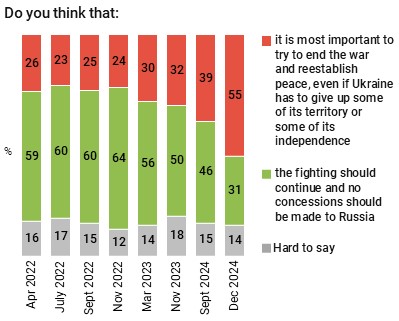32/2024
2025-01-03
For the first time a majority of Poles think the war in Ukraine should be ended even at the cost of concessions to Russia
At various stages of the war, the dominant feeling among Polish people has always been that Ukrainians (with Western support) should continue to fight and make no concessions to Russia. Nevertheless, since the beginning of the war’s second year, this proportion has been steadily diminishing and now, over the last three months, it has dropped fifteen percentage points. Currently, for the first time since the outbreak of the war, the dominant opinion among Poles is that the conflict needs to be ended and peace declared, even if Ukraine would have to give up some of its territory or independence as a result (55% compared to 39% in September). Fewer than one in three Polish people now believe the struggle should continue without conceding anything to Russia (31% as against 46% in September).

|
Support for peace talks is more frequent in the 18–24 age group, among inhabitants of the smallest towns, among the less-educated, those who think they are badly-off, who engage more frequently in religious practices and who hold right-wing views. It is also especially high among voters of right-wing opposition parties – Confederation in particular, but also Law and Justice. Opinions on the subject in the electorates of Civic Coalition and the Third Way are rather divided.
More on this subject in the CBOS report.
This ‘Current Events and Problems’ survey (416) was conducted using a mixed-mode procedure on a representative sample of named adult residents of Poland, randomly selected from the National Identity Number (PESEL) register. Respondents independently selected one of the following methods: Computer Assisted Personal Interview (CAPI); Computer Assisted Telephone Interview (CATI), respondents receiving researchers’ telephone numbers in an introductory letter from CBOS; Computer Assisted Web Interview (CAWI), where respondents filled in the online questionnaire independently, gaining access by means of a login and password provided in an introductory letter from CBOS. In all three cases the questionnaire had the same structure and comprised the same questions. The survey was carried out between 28 November and 8 December 2024 inclusive on a sample of 915 people (56.6% using the CAPI method, 26.9% CATI and 16.5% CAWI). CBOS has been conducting statutory research using the above procedure since May 2020, stating in each case the percentage of personal, telephone and internet interviews.





